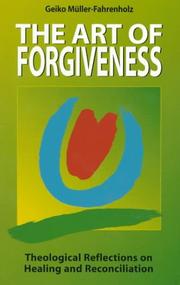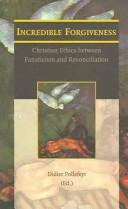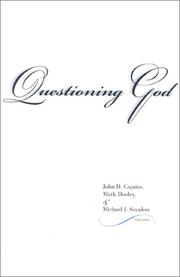| Listing 1 - 7 of 7 |
Sort by
|

ISBN: 2825412244 9782825412244 Year: 1997 Publisher: Geneva WCC
Abstract | Keywords | Export | Availability | Bookmark
 Loading...
Loading...Choose an application
- Reference Manager
- EndNote
- RefWorks (Direct export to RefWorks)
Sacraments --- Forgiveness --- Forgiveness. --- Reconciliation --- Religious aspects --- Christianity. --- Unforgiveness --- Peace making --- Peacemaking --- Reconciliatory behavior --- Religious aspects&delete& --- Christianity --- Conduct of life --- Absolution --- Amnesty --- Clemency --- Pardon --- Quarreling --- Forgiveness - Religious aspects - Christianity. --- Reconciliation - Religious aspects - Christianity.
Book
ISBN: 9780521119481 9780511978654 0521119480 Year: 2012 Publisher: Cambridge Cambridge University Press
Abstract | Keywords | Export | Availability | Bookmark
 Loading...
Loading...Choose an application
- Reference Manager
- EndNote
- RefWorks (Direct export to RefWorks)
"In this book, twelve eminent scholars of classical antiquity and ancient and medieval Judaism and Christianity explore the nature and place of forgiveness in the pre-modern Western world. They discuss whether the concept of forgiveness, as it is often understood today, was absent, or at all events more restricted in scope than has been commonly supposed, and what related ideas (such as clemency or reconciliation) may have taken the place of forgiveness. An introductory chapter reviews the conceptual territory of forgiveness and illuminates the potential breadth of the idea, enumerating the important questions a theory of the subject should explore. The following chapters examine forgiveness in the contexts of classical Greece and Rome; the Hebrew Bible, the Talmud, and Moses Maimonides; and the New Testament, the Church Fathers, and Thomas Aquinas"--
Religion --- --Pardon --- --Christianisme --- --Judaïsme --- --Religions antiques --- --Forgiveness --- Forgiveness --- Religious aspects --- Christianity --- Judaism --- Ancient & Classical --- Ancient & Classical. --- Forgiveness. --- Philosophy --- Christianity. --- Judaism. --- History & Surveys --- General ethics --- Pardon --- Christianisme --- Judaïsme --- Religions antiques --- Forgiveness - Religious aspects - Christianity --- Forgiveness - Religious aspects - Judaism
Book
ISBN: 1107222745 1139179128 1280773421 9786613684196 1139188623 1139185020 1139182714 1139187341 113918993X 0511978650 9781139189934 9780521119481 0521119480 Year: 2012 Publisher: New York ; Cambridge : Cambridge University Press,
Abstract | Keywords | Export | Availability | Bookmark
 Loading...
Loading...Choose an application
- Reference Manager
- EndNote
- RefWorks (Direct export to RefWorks)
In this book, eminent scholars of classical antiquity and ancient and medieval Judaism and Christianity explore the nature and place of forgiveness in the pre-modern Western world. They discuss whether the concept of forgiveness, as it is often understood today, was absent, or at all events more restricted in scope than has been commonly supposed, and what related ideas (such as clemency or reconciliation) may have taken the place of forgiveness. An introductory chapter reviews the conceptual territory of forgiveness and illuminates the potential breadth of the idea, enumerating the important questions a theory of the subject should explore. The following chapters examine forgiveness in the contexts of classical Greece and Rome; the Hebrew Bible, the Talmud, and Moses Maimonides; and the New Testament, the Church Fathers, and Thomas Aquinas.
Forgiveness. --- Forgiveness --- Unforgiveness --- Conduct of life --- Absolution --- Amnesty --- Clemency --- Pardon --- Religious aspects --- Christianity. --- Judaism. --- Arts and Humanities --- History --- Religion --- Christianisme --- Judaïsme --- Religions antiques --- Forgiveness - Religious aspects - Christianity --- Forgiveness - Religious aspects - Judaism

ISBN: 9042913177 9789042913172 Year: 2004 Publisher: Leuven Peeters
Abstract | Keywords | Export | Availability | Bookmark
 Loading...
Loading...Choose an application
- Reference Manager
- EndNote
- RefWorks (Direct export to RefWorks)
Religious fanaticism. --- Theologische ethiek: schuld; zonde; bekering; verzoening --- 241.4 Theologische ethiek: schuld; zonde; bekering; verzoening --- Christian ethics --- Forgiveness --- Religious fanaticism --- Academic collection --- 241.4 --- 241 --- Fanaticism --- Unforgiveness --- Conduct of life --- Absolution --- Amnesty --- Clemency --- Pardon --- Ethical theology --- Moral theology --- Theology, Ethical --- Theology, Moral --- Christian life --- Christian philosophy --- Religious ethics --- Religious aspects&delete& --- Christianity --- Moraaltheologie. Theologische ethiek --- Christian moral theology --- Christian ethics. --- Religious aspects --- Christianity. --- Forgiveness - Religious aspects - Christianity.

ISBN: 1282066137 9780253108675 0253108675 9780253108678 0253214742 9780253214744 0253339812 9780253339812 9781282066137 Year: 2001 Publisher: Bloomington, Ind. Indiana University Press
Abstract | Keywords | Export | Availability | Bookmark
 Loading...
Loading...Choose an application
- Reference Manager
- EndNote
- RefWorks (Direct export to RefWorks)
In 15 insightful essays, Jacques Derrida and an international group of scholars of religion explore postmodern thinking about God and consider the nature of forgiveness in relation to the paradoxes of the gift. Among the themes addressed by contributors are the possibilities of imagining God as unthinkable, imagining God as non-patriarchal, imagining a return to Augustine, and imagining an age in which praise is far more important than narrative. Questioning God moves readers beyond the parameters of m
Christianity. --- Derrida, Jacques. --- Forgiveness. --- Forgiveness - Religious aspects - Christianity - C. --- Religious aspects. --- Forgiveness --- 241.4 --- Unforgiveness --- Conduct of life --- Absolution --- Amnesty --- Clemency --- Pardon --- Religious aspects --- Christianity --- Theologische ethiek: schuld; zonde; bekering; verzoening --- Derrida, Jacques --- Derrida, J. --- Derida, Žak --- Derrida, Jackes --- Derrida, Zhak --- Deridah, Z'aḳ --- Deridā, Jāka --- Dirīdā, Jāk --- Деррида, Жак --- דרידה, ז'אק --- Religion --- 241.4 Theologische ethiek: schuld; zonde; bekering; verzoening --- Metaphysics --- Natural theology

ISBN: 9004112839 9004332413 9789004112834 Year: 1999 Volume: 45 Publisher: Leiden ; Boston : Brill,
Abstract | Keywords | Export | Availability | Bookmark
 Loading...
Loading...Choose an application
- Reference Manager
- EndNote
- RefWorks (Direct export to RefWorks)
This volume provides important new insights into the concept of 'forgiveness' in early Christian literature. In contrast to much of the existing literature on the notion of forgiveness, which usually focuses on the preconditions for being forgiven, the author sets out to describe the actual meanings and connotations of this concept during the period in which the New Testament was being formed. In early Christian texts the notion of forgiveness is expressed in a variety of ways. On the basis of detailed analysis of a number of early Christian and contemporary Jewish prayers the author uncovers an array of different shades of meaning, which often can be obscured in modern translations. In so doing he demonstrates the importance of this complex of meanings for early Christians, not only as part of their soteriology, but in their overall theological outlook as well.
Forgiveness --- Apocryphal books (Old Testament) --- Religious aspects --- Christianity --- Biblical teaching --- Judaism --- Criticism, interpretation, etc --- 225.08*2 --- -Forgiveness --- -Unforgiveness --- Conduct of life --- Absolution --- Amnesty --- Clemency --- Pardon --- Theologie van het Nieuwe Testament: moraal; ethica; juridica Israelis --- -Christianity --- -Biblical teaching --- -Judaism --- History and criticism --- -Theologie van het Nieuwe Testament: moraal; ethica; juridica Israelis --- 225.08*2 Theologie van het Nieuwe Testament: moraal; ethica; juridica Israelis --- -225.08*2 Theologie van het Nieuwe Testament: moraal; ethica; juridica Israelis --- Unforgiveness --- Religious aspects&delete& --- Christianity&delete& --- Judaism&delete& --- Forgiveness - Religious aspects - Christianity - Biblical teaching --- Forgiveness - Religious aspects - Judaism - Biblical teaching --- Apocryphal books (Old Testament) - Criticism, interpretation, etc --- Old Testament apocryphal books --- Pseudepigraphal books (Old Testament) --- Biblical teaching. --- Criticism, interpretation, etc.
Book
ISBN: 9781107008366 9781139017671 9781107414815 9781139190879 1139190873 1139185977 9781139185974 1139017675 9781139188272 1139188275 1283384078 9781283384070 1107008360 1139179829 1107227917 9786613384072 1139189573 1139183656 1107414814 Year: 2012 Volume: 150 Publisher: Cambridge, UK New York Cambridge University Press
Abstract | Keywords | Export | Availability | Bookmark
 Loading...
Loading...Choose an application
- Reference Manager
- EndNote
- RefWorks (Direct export to RefWorks)
The Gospels record that Jesus purported to forgive sins. What significance would such a claim have had for his contemporaries and what would the implications have been for his identity as a first-century popular prophet? Tobias Hägerland answers these questions and more as he investigates the forgiveness of sins in the mission of the historical Jesus. The Gospels are interpreted within the context of first-century Judaism as part of a broader reconstruction of Jesus' career as a healer and prophet, and rhetorical criticism is introduced as a tool for explaining how the gospel tradition about Jesus and forgiveness developed. Hägerland combines detailed exegesis and rigorous methodology with a holistic view of the historical Jesus, evaluating recent scholarship about first-century Jewish prophets and utilizing previously neglected textual evidence to present a thorough investigation of the theology of forgiveness in early Judaism and primitive Christianity.
Forgiveness of sin. --- Forgiveness --- Religious aspects --- Christianity. --- Jesus Christ --- Person and offices. --- Bible. --- Criticism, interpretation, etc. --- 225.08*3 --- Theologie van het Nieuwe Testament: themata --- 225.08*3 Theologie van het Nieuwe Testament: themata --- Forgiveness of sin --- Unforgiveness --- Conduct of life --- Absolution --- Amnesty --- Clemency --- Pardon --- Sin, Forgiveness of --- Sin --- Religious aspects&delete& --- Christianity --- Christ --- Cristo --- Jezus Chrystus --- Jesus Cristo --- Jesus, --- Jezus --- Christ, Jesus --- Yeh-su --- Masīḥ --- Khristos --- Gesù --- Christo --- Yeshua --- Chrystus --- Gesú Cristo --- Ježíš --- Isa, --- Nabi Isa --- Isa Al-Masih --- Al-Masih, Isa --- Masih, Isa Al --- -Jesus, --- Jesucristo --- Yesu --- Yeh-su Chi-tu --- Iēsous --- Iēsous Christos --- Iēsous, --- Kʻristos --- Hisus Kʻristos --- Christos --- Jesuo --- Yeshuʻa ben Yosef --- Yeshua ben Yoseph --- Iisus --- Iisus Khristos --- Jeschua ben Joseph --- Ieso Kriʻste --- Yesus --- Kristus --- ישו --- ישו הנוצרי --- ישו הנצרי --- ישוע --- ישוע בן יוסף --- المسيح --- مسيح --- يسوع المسيح --- 耶稣 --- 耶稣基督 --- 예수그리스도 --- Jíizis --- Yéshoua --- Iėsu̇s --- Khrist Iėsu̇s --- عيسىٰ --- Evangelie (Book of the New Testament) --- Fukuinsho (Books of the New Testament) --- Gospels (Books of the New Testament) --- Gospels, Synoptic (Books of the New Testament) --- Synoptic Gospels (Books of the New Testament) --- عيسىٰ --- Arts and Humanities --- Religion --- Forgiveness - Religious aspects - Christianity. --- Jesus Christ - Person and offices.
| Listing 1 - 7 of 7 |
Sort by
|

 Search
Search Feedback
Feedback About UniCat
About UniCat  Help
Help News
News